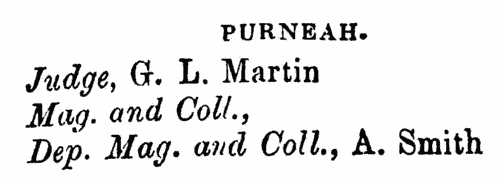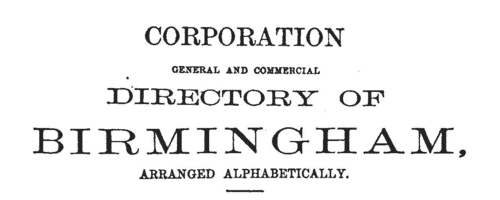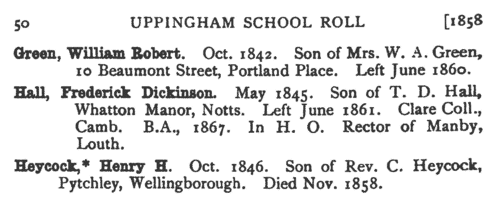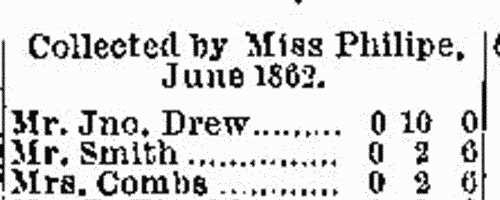Strickland Surname Ancestry ResultsOur indexes 1000-1999 include entries for the spelling 'strickland'. In the period you have requested, we have the following 683 records (displaying 451 to 460): Single Surname Subscription | | | Buying all 683 results of this search individually would cost £3,676.00. But you can have free access to all 683 records for a year, to view, to save and print, for £100. Save £3,576.00. More... |
These sample scans are from the original record. You will get scans of the full pages or articles where the surname you searched for has been found. Your web browser may prevent the sample windows from opening; in this case please change your browser settings to allow pop-up windows from this site.  Sailors and marines on board Her Majesty's ship Vulcan
(1860) Sailors and marines on board Her Majesty's ship Vulcan
(1860)
The China Medal was awarded to soldiers and sailors involved in the various actions of the war against China, in which this ship was engaged in 1860. The medals were either delivered on board or sent on in 1862: except that many of the men were no longer immediately traceable, and the remarks on the roll show that some medals were not sent on for several years, and some were never sent. After the main roll there is a section showing which of the men also qualified for clasps. Separate clasps were awarded for men who had been in receipt of the China Medal of 1842; for the taking of Fatshan in 1857, Canton in 1857, Taku Forts in 1858, Taku Forts in 1860, and Pekin in 1860. Most of the men on this ship are shown as having been given the Taku Forts 1860 clasp, for being actually present at the capture of the Taku Forts 21 August 1860.STRICKLAND. Cost: £8.00.  | Sample scan, click to enlarge

| British officers and civil servants in India
(1861)
The Indian Army and Civil Service List for July 1861 was printed by order of the Secretary of State for India in Council. Dating from after the reform of British rule in India in 1858, the one volume brings together lists of British military officers and civil officials. The regimental lists for the army in the three presidencies (Bengal, Madras and Bombay) are arranged as in any Army List of the period, giving officers by rank, with date of rank in the regiment and the army, and remarks. The native regiments had been reorganised and reduced from 174,237 of all ranks on 1 January 1859 to about 110,400 men in 1861. There are summary lists of all the native military, giving for each the names and dates of appointment of the British commandant, second-in-command, adjutant and medical charge - the Agra Levy, Alexander's Horse, Allahabad Levy, Allygurh Levy, Arracan Battalion, Assam Light Infantry, Bareilly Levy, Belooch Regiments, Benares Horse, Candeish Bheel Corps, Cawnpore Levy, Cutch Legion, Deolee Irregular Force, East Indian Regiment, Erinpoora Irregular Force, Extra Goorkha Regiment, Fane's Horse, Ferozepore Regiment, Futtehgurh Levy, Ghaut Police Corps, Guide Corps, Guzerat Bheel Corps, Guzerat Cooly Police Corps, Guzerat Irregular Horse, Guzerat Police Corps, Guzerat Provincial Battalion, Gwalior Camel Corps, Gwalior Infantry, Hazara Goorka Battalion, Hill Rangers, Hodson's Horse, Hyderabad Contingent, Jacob's Rifles, Kamroop Regiment, Kemaoon Battalion, Kemaoon Levy, Khelat-i-Ghilzie Regiment, Kolapore Infantry, Lahore Horse, Lucknow Regiment, Loodianah Regiment, Mahratta Horse, Malwa Bheel Corps, Meade's Horse, Meerut Levy, Meywar Bheel Corps, Mhair Regiment, Mhairwarrah Battalion, Mooltanee Cavalry, Moradabad Levy, Murray's Jhat Horse, Mynpoorie Levy, Nagpore Irregular Force, Nusseree Battalion, Patan Cavalry, Pegu Light Infantry Battalion, Ramgurh Irregular Cavalry, Poona Horse, Poorbeah Regiment, Punjab Cavalry, Punjab Infantry, Punjab Irregulars, Robarts's Horse, Rohilcund Horse, Rutnagherry Rangers, Sattara Local Corps, Sawunt Waree Local Corps, Scinde Horse, Sebundy Sappers and Miners, Seikh Infantry, Seikh Irregulars, Shahjehanpore Levy, Shekhawatee Battalion, Sirmoor Rifles, and Sylhet Light Infantry. European civil servants are listed from the Accountant-General's Office, Audit Department, Civil Service, Government Offices, Judge Advocate-General's Department, Public Works Departments and Surveyor-General's Department; and there are clergy, law and medical lists. STRICKLAND. Cost: £4.00.  | Sample scan, click to enlarge

| Long-stay Paupers in Workhouses: Sherborne
(1861)
This comprehensive return by the Poor Law Board for England and Wales in July 1861 revealed that of the 67,800 paupers aged 16 or over, exclusive of vagrants, then in the Board's workhouses, 14,216 (6,569 men, 7,647 women) had been inmates for a continuous period of five years and upwards. The return lists all these long-stay inmates from each of the 626 workhouses that had been existence for five years and more, giving full name; the amount of time that each had been in the workhouse (years and months); the reason assigned why the pauper in each case was unable to sustain himself or herself; and whether or not the pauper had been brought up in a district or workhouse school (very few had). The commonest reasons given for this long stay in the workhouse were: old age and infirm (3,331); infirm (2,565); idiot (1,565); weak mind (1,026); imbecile (997); and illness (493). STRICKLAND. Cost: £6.00.  | Sample scan, click to enlarge

| Long-stay Paupers in Workhouses: St Pancras Parish
(1861)
This comprehensive return by the Poor Law Board for England and Wales in July 1861 revealed that of the 67,800 paupers aged 16 or over, exclusive of vagrants, then in the Board's workhouses, 14,216 (6,569 men, 7,647 women) had been inmates for a continuous period of five years and upwards. The return lists all these long-stay inmates from each of the 626 workhouses that had been existence for five years and more, giving full name; the amount of time that each had been in the workhouse (years and months); the reason assigned why the pauper in each case was unable to sustain himself or herself; and whether or not the pauper had been brought up in a district or workhouse school (very few had). The commonest reasons given for this long stay in the workhouse were: old age and infirm (3,331); infirm (2,565); idiot (1,565); weak mind (1,026); imbecile (997); and illness (493). STRICKLAND. Cost: £6.00.  | Sample scan, click to enlarge

| Members of the Royal Agricultural Society of England
(1861)
The list of members of the Royal Agricultural Society gives names and addresses: life members are indicated by a dagger. (The names of 60 members were omitted on account of their subscriptions to the society being in arrear to 31 December 1859). This list is correct to June 1861; as of 11 December of that year there were 84 life governors, 95 annual governors, 1124 life members, 3399 annual members and 17 honorary members, making a total of 4719 names, mostly of landowners and agriculturists.STRICKLAND. Cost: £4.00.  | Sample scan, click to enlarge

| Residents and Traders in Birmingham
(1861)
William Cornish's Corporation General and Trades Directory covered Birmingham, Coventry and the towns of the Black Country. The Birmingham section contains both street lists and this general alphabetical directory. STRICKLAND. Cost: £4.00.  | Sample scan, click to enlarge

| Boys entering Uppingham School
(1862)
The public school at Uppingham in Rutland was founded by Archdeacon Johnson in 1584. A roll of scholars from 1824 to 1905 was edited by J. P. Graham, and published in 1906. This was a revision and updating of an 1894 edition of the roll, the great bulk of the work having been done by Mrs Mullins. The roll is arranged by year, and within each year by term of entrance, and then alphabetically by surname within each term. Each boy's name is given, surname first, with an asterisk where known (in 1906) to have died. Then there is month and year of birth, father's name (most often just surname and initials) and address (at entrance). Where the boy represented the school at Rugby football (XV) or cricket (XI), that is indicated. After the month and year of leaving the school, there is a brief summary of achievements in later life, and, where known, address as in 1906. STRICKLAND. Cost: £4.00.  | Sample scan, click to enlarge

| Civil Service Appointments
(1862)
The Civil Service Commission published an annual list of all persons who had obtained certificates of qualification for appointment in the various public departments. The list gives full name (surname first); department (such as Post Office, or Inland Revenue); situation (such as Letter-carrier, or Clerk); and date of certificate. Candidates whose names are preceded by a dagger obtained appointments as the result of competition; a double dagger indicates open competition. Those whose names are preceded by an asterisk obtained honorary additions to their certificates either for proficiency in extra subjects chosen by themselves, or for marked proficiency in the prescribed subjects. Then follows a further list of these candidates who had obtained Honorary Additions to their Certificates in this way: giving name (surname and initials); position in the service (department and situation); subjects for which honorary additions were made; and 'extent of knowledge displayed' (such as Creditable, Fair, or Very Creditable). 1 January to 31 December 1862.STRICKLAND. Cost: £4.00.  | Sample scan, click to enlarge

| Mathematics students at Cambridge University
(1862)
Tripos lists or examination results for the year, arranged by class (Wranglers, Senior Optimes and Junior Optimes), and within each class in order of score in the examination (the names of candidates with equal scores are bracketed together, with the word 'AEq.'). Each student's surname and college is given: this list was printed in 1890, and was annotated with asterisks to show which students had subsequently become fellows of the university; and with footnotes showing those who became headmasters, &c., elsewhere. Winners of Dr Smith's Mathematical Prizes are marked (1) senior, (2) for junior. The Greek letter alpha is affixed to the names of those students who had gained first class results in the Classical Tripos; beta to those entered in the second class; and gamma to those entered in the third class. These lists are particularly useful in identifying for an individual the fellow-students who will have attended lectures with him; and, where from the college, are likely to have been even more closely associated by having been under the same supervisor. (The sample scan is from the start of the Mathematics Tripos list for 1770)STRICKLAND. Cost: £6.00.  | Sample scan, click to enlarge

| Missionaries and contributors
(1863)
The Evangelical Magazine and Missionary Chronicle records the work of Christian missionaries throughout the world, and of the supporting missionary societies collecting money for the work in the British Isles. Contributions are listed by congregation, and by family members making donations.STRICKLAND. Cost: £8.00.  | Sample scan, click to enlarge

|
Research your ancestry, family history, genealogy and one-name study by direct access to original records and archives indexed by surname.
|













